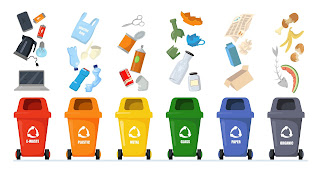Recycling for Schools
Have a LOOK BEHIND MOST SCHOOLS and you're going to see dumpsters filled with classroom paper, plastic bags, lost cafeteria meals, milk cartons and paper towels. Day-to-day surgeries in a standard school demand a great deal of resources, hardly any of that has reused, recycled or recovered.
See among 31 Green Star Schools, including 14,000 staff and students in Boulder County, Colorado, and the narrative differs. Hallways and Faculties are still bustling, but out you locate dumpsters not just for garbage, but also for recycling and compost. Most likely the garbage container is less than half a while the recycling and compost containers have been brimming. What's that possible?
Eco-Cycle, among the earliest and biggest non-profit recycling organizations from the U.S., has coordinated recycling solutions and environmental education programs into both local public school districts (80 colleges ) as 1987.
A lot people consider recycling and composting, but what's Zero Waste? Zero Waste is much more of a target, compared to a zero. Here's a comprehensive and broad definition:
Waiting for zero waste isn't an end-of-pipe alternative. That's exactly why it heralds basic shift. It means stopping subsidies for squandering. This means closing the gap between paychecks costs as well as their true costs. This means making producers take responsibility for the whole lifecycle of their products and packaging. Zero waste attempts, like recycling efforts earlier, will alter the face of sound waste management later on. Rather than managing wastes, we'll manage resources and attempt to get rid of waste."
While Zero Waste could function as philosophical target, kids are often very literal. They might feel as though they've failed if there's a crap left over after each of their attempts. Eco-Cycle's application is named Green Star Schools for this very reason. You might also wish to choose a title for your job that does not incorporate the zero.
The program includes three stages. The first stage, such as the next, is completed in the session Before the college's kick-off:
Meet with the principal and personnel to ensure sufficient support of this program.
The next stage involves a high level of education and training. The whole school community is concerned. All-school kick-off assemblies, setting up containers for recycling and compost, staff and classroom trainings and lunchroom tracking are done in the next semester of every school's participation. We discover it is simpler to begin in the next semester, rather than at the fall when school and classroom patterns are still being established.
The next and last stage guarantees that the application is continuing. To maintain student excitement high and college employees encouraging, education is vital. Offering many different ongoing benefits is essential to keeping colleges involved.
Distribution of newsletters to discuss innovative ideas between colleges.
Classroom clean-out occasions to recycle and reuse extra school provides at the close of the year.
Waste-free lunch suites (hints, hints and statements ) to promote waste- reduction in the lunch area (encouraging reusable lunch bags and containers, etc.. )
Assist in organizing Zero Waste all-school occasions, such as pancake breakfasts, school carnivals and dances.
Promotion of these colleges' attempts with site links, newspaper advertisements, advertising and banners.
A five-year anniversary party which includes award assemblies, lunchroom tracking, classroom trainings, reuse craft awards and projects for students.
The Green Star version has been successful as a result of partnership between Eco-Cycle along with both local school districts. But several school districts might not have a recycling company to associate with to execute a thorough Zero Waste program. What then?
When launch some comprehensive Zero Waste application, it is suggested to implement the application in stages. Take inventory of what is going on in your district and school and move in phases. These are jobs that may work for communities and schools of any size. If recycling programs exist but are not implemented in the colleges, explore choices to start recycling. Last, look at home and determine what set providers are in your region.
Regardless of what job your college is working on, it is important to include schooling. Focus solely on surgeries and the job will fail. Successful education and training helps to ensure that substances are going to have less pollution and the program will likely be in existence for the long term, not until the first excitement dies down.
See among 31 Green Star Schools, including 14,000 staff and students in Boulder County, Colorado, and the narrative differs. Hallways and Faculties are still bustling, but out you locate dumpsters not just for garbage, but also for recycling and compost. Most likely the garbage container is less than half a while the recycling and compost containers have been brimming. What's that possible?
Eco-Cycle, among the earliest and biggest non-profit recycling organizations from the U.S., has coordinated recycling solutions and environmental education programs into both local public school districts (80 colleges ) as 1987.
A lot people consider recycling and composting, but what's Zero Waste? Zero Waste is much more of a target, compared to a zero. Here's a comprehensive and broad definition:
Waiting for zero waste isn't an end-of-pipe alternative. That's exactly why it heralds basic shift. It means stopping subsidies for squandering. This means closing the gap between paychecks costs as well as their true costs. This means making producers take responsibility for the whole lifecycle of their products and packaging. Zero waste attempts, like recycling efforts earlier, will alter the face of sound waste management later on. Rather than managing wastes, we'll manage resources and attempt to get rid of waste."
While Zero Waste could function as philosophical target, kids are often very literal. They might feel as though they've failed if there's a crap left over after each of their attempts. Eco-Cycle's application is named Green Star Schools for this very reason. You might also wish to choose a title for your job that does not incorporate the zero.
The program includes three stages. The first stage, such as the next, is completed in the session Before the college's kick-off:
Meet with the principal and personnel to ensure sufficient support of this program.
The next stage involves a high level of education and training. The whole school community is concerned. All-school kick-off assemblies, setting up containers for recycling and compost, staff and classroom trainings and lunchroom tracking are done in the next semester of every school's participation. We discover it is simpler to begin in the next semester, rather than at the fall when school and classroom patterns are still being established.
The next and last stage guarantees that the application is continuing. To maintain student excitement high and college employees encouraging, education is vital. Offering many different ongoing benefits is essential to keeping colleges involved.
Distribution of newsletters to discuss innovative ideas between colleges.
Classroom clean-out occasions to recycle and reuse extra school provides at the close of the year.
Waste-free lunch suites (hints, hints and statements ) to promote waste- reduction in the lunch area (encouraging reusable lunch bags and containers, etc.. )
Assist in organizing Zero Waste all-school occasions, such as pancake breakfasts, school carnivals and dances.
Promotion of these colleges' attempts with site links, newspaper advertisements, advertising and banners.
A five-year anniversary party which includes award assemblies, lunchroom tracking, classroom trainings, reuse craft awards and projects for students.
The Green Star version has been successful as a result of partnership between Eco-Cycle along with both local school districts. But several school districts might not have a recycling company to associate with to execute a thorough Zero Waste program. What then?
When launch some comprehensive Zero Waste application, it is suggested to implement the application in stages. Take inventory of what is going on in your district and school and move in phases. These are jobs that may work for communities and schools of any size. If recycling programs exist but are not implemented in the colleges, explore choices to start recycling. Last, look at home and determine what set providers are in your region.
Regardless of what job your college is working on, it is important to include schooling. Focus solely on surgeries and the job will fail. Successful education and training helps to ensure that substances are going to have less pollution and the program will likely be in existence for the long term, not until the first excitement dies down.
Donate Swag, Old Branded Merchandise at SwagCycle that helps companies and people keep their waste out of landfills.



Comments
Post a Comment